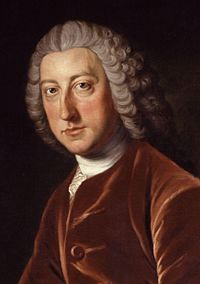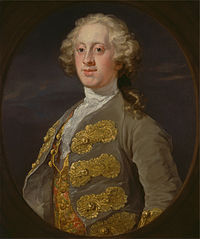The government of Great Britain was under the joint leadership of William Pitt the Elder (in the House of Commons) and William Cavendish, 4th Duke of Devonshire (in the House of Lords), between November 1756 and April 1757—when Pitt was dismissed by George II of Great Britain. The King disliked Pitt, but Pitt's influence in the Commons had led to his crucial appointment as Southern Secretary in a ministry nominally headed by Devonshire.[1]
Ministry
editPrincipal ministers of the Crown were as follows:
| Portfolio | Minister | Took office | Left office |
|---|---|---|---|
| First Lord of the Treasury[2] | (head of ministry) | 16 November 1756 | 1757 |
| Chancellor of the Exchequer[3] | 16 November 1756 | 1757 | |
| 13 April 1757 | 1757 | ||
| Lord Privy Seal[2] | 22 December 1755 | 1757 | |
| Chancellor of the Duchy of Lancaster[2] | 22 December 1743 | 1757 | |
| Secretary of State for the Southern Department[3] | (head of ministry) | 4 December 1756 | 6 April 1757 |
| Secretary of State for the Northern Department[4] | 23 March 1754 | 9 June 1757 | |
| First Lord of Trade[4] | 1 November 1748 | 1757 | |
| First Lord of the Admiralty[5] | 19 November 1756 | 6 April 1757 | |
| 6 April 1757 | 1757 | ||
| Treasurer of the Navy[4] | 23 November 1756 | 1757 | |
| Lord Lieutenant of Ireland[4] | 2 April 1755 | 3 January 1757 | |
| 3 January 1757 | 1757 |
See also
editNotes
edit- ^ Leonard 2011, p. 65
- ^ a b c Cook & Stevenson 1988, p. 44
- ^ a b Cook & Stevenson 1988, p. 44; Gazette 1757
- ^ a b c d Cook & Stevenson 1988, p. 45
- ^ Cook & Stevenson 1988, p. 45 ; Gazette 1757
References
edit- Cook, Chris; Stevenson, John (1988), British Historical Facts: 1688–1760, Palgrave Macmillan UK, ISBN 978-1-349-02369-1
- Leonard, Dick (2011), Eighteenth-Century British Premiers, Basingstoke: Palgrave Macmillan, LCCN 2011453406
- "No. 9676", The London Gazette, 5 April 1757, p. 2

